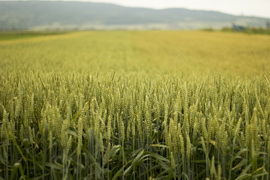
International Research Team Develops Much Needed Genetic Resource in Improving Wheat Varieties
January 18, 2017| |
 Researchers from the Howard Hughes Medical Institute (HHMI) and University of California, Davis in the United States, and the John Innes Centre in the United Kingdom have developed a much-needed genetic resource that will help accelerate the study of gene functions in wheat. The resource, a collection of bread and pasta wheat seeds with more than 10 million sequenced and carefully catalogued genetic mutations, is freely available to wheat breeders and researchers.
Researchers from the Howard Hughes Medical Institute (HHMI) and University of California, Davis in the United States, and the John Innes Centre in the United Kingdom have developed a much-needed genetic resource that will help accelerate the study of gene functions in wheat. The resource, a collection of bread and pasta wheat seeds with more than 10 million sequenced and carefully catalogued genetic mutations, is freely available to wheat breeders and researchers.
Wheat is an important crop, but a key genetic feature makes the plant difficult to study and manipulate. Wheat is polyploid, with multiple copies of its genome in every cell. Pasta wheat has two copies of every gene, and bread wheat has three.
Five years ago, the research team chemically induced random genetic mutation in thousands of wheat seeds. They developed an approach that lets them focus on the small fraction of the genome that encodes proteins. The team sequenced 400 billion bases of DNA and analyzed the 2,375 mutant lines that grew from the mutated seeds. Sequences of the 2,375 wheat lines are available to the public, and more than 3,000 seed stocks have been distributed to wheat researchers around the world.
For more details, read the news release at the HHMI website. The sequences are available at the Dubcovsky Lab at UC Davis, and at the Wheat TILLING website.
| |
Biotech Updates is a weekly newsletter of ISAAA, a not-for-profit organization. It is distributed for free to over 22,000 subscribers worldwide to inform them about the key developments in biosciences, especially in biotechnology. Your support will help us in our mission to feed the world with knowledge. You can help by donating as little as $10.
-
See more articles:
-
News from Around the World
- International Research Team Develops Much Needed Genetic Resource in Improving Wheat Varieties
- Bibliotheca Alexendrina Holds Workshop on Ethics in Gene Editing
- USDA Deregulates GE Creeping Bent Grass
- ORNL Researchers Release Largest Poplar SNP Dataset
- White House Announces 2017 Update to the Coordinated Framework for the Regulation of Biotechnology
- Punjab Agri Minister Visits Biotech Corn Field
- BARI Scientists Apply for Commercial Release of GE Potato in Bangladesh
- EFSA Publishes Scientific Opinion for Renewal of Application for GM Maize 1507
-
Research Highlights
- Scientists Conduct Functional Characterization of Powdery Mildew Susceptibility Gene in Eggplant
- OsNAC6 Rice Transcription Factor Regulates Multiple Drought Tolerance Pathways
-
Beyond Crop Biotech
- Study Details Structure of Immature Zika Virus
- Researchers Crack Arabica Coffee Genome
-
Announcements
- 2nd International Conference on BioScience and Biotechnology
-
Plant
- Enhancement of Fatty Acid Composition in Camelina using CRISPR/Cas9
- Researchers Discover Off-Switch to CRISPR-Cas9 Gene Editing System
-
Read the latest: - Biotech Updates (December 17, 2025)
- Gene Editing Supplement (December 17, 2025)
- Gene Drive Supplement (February 22, 2023)
-
Subscribe to BU: - Share
- Tweet
